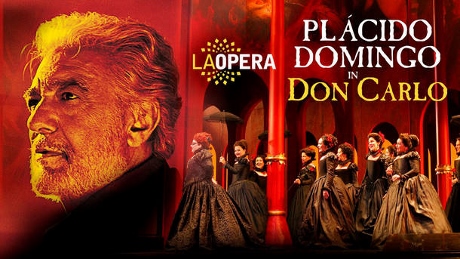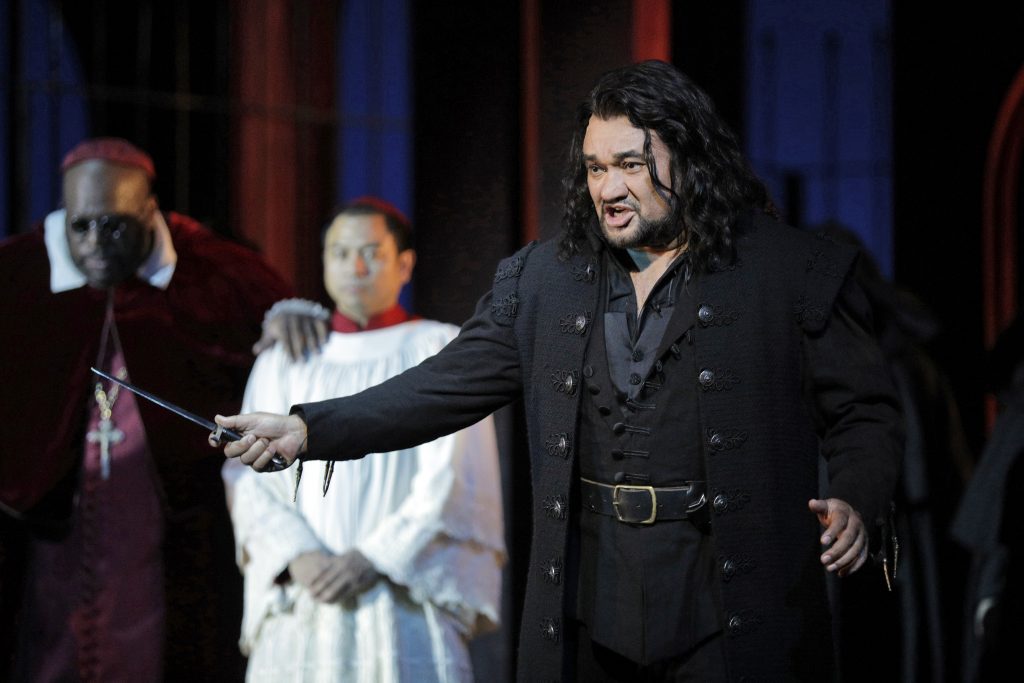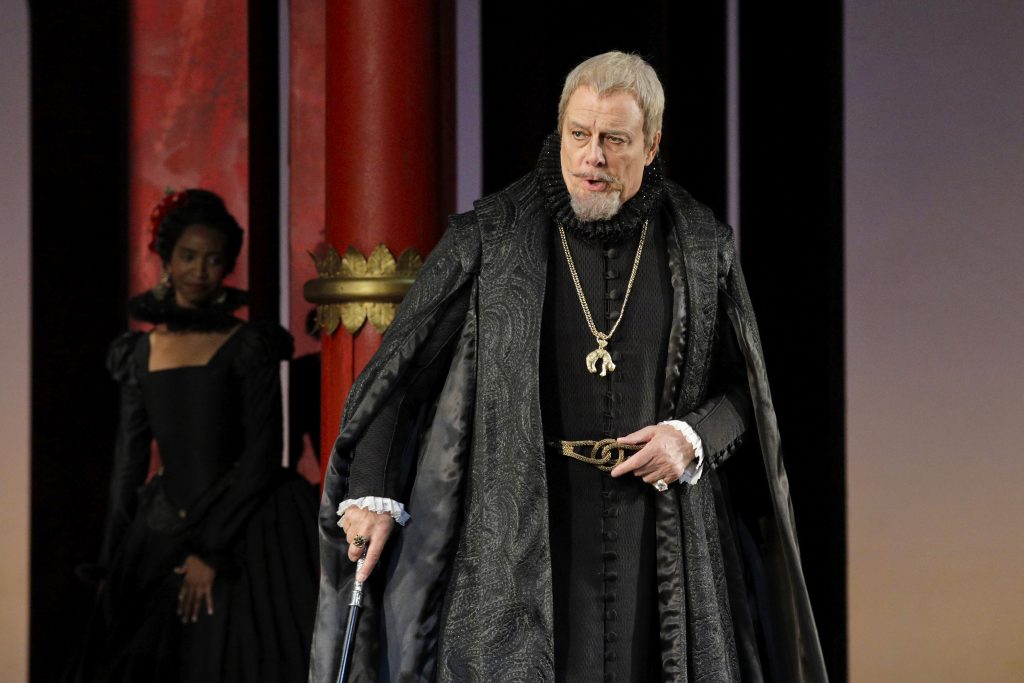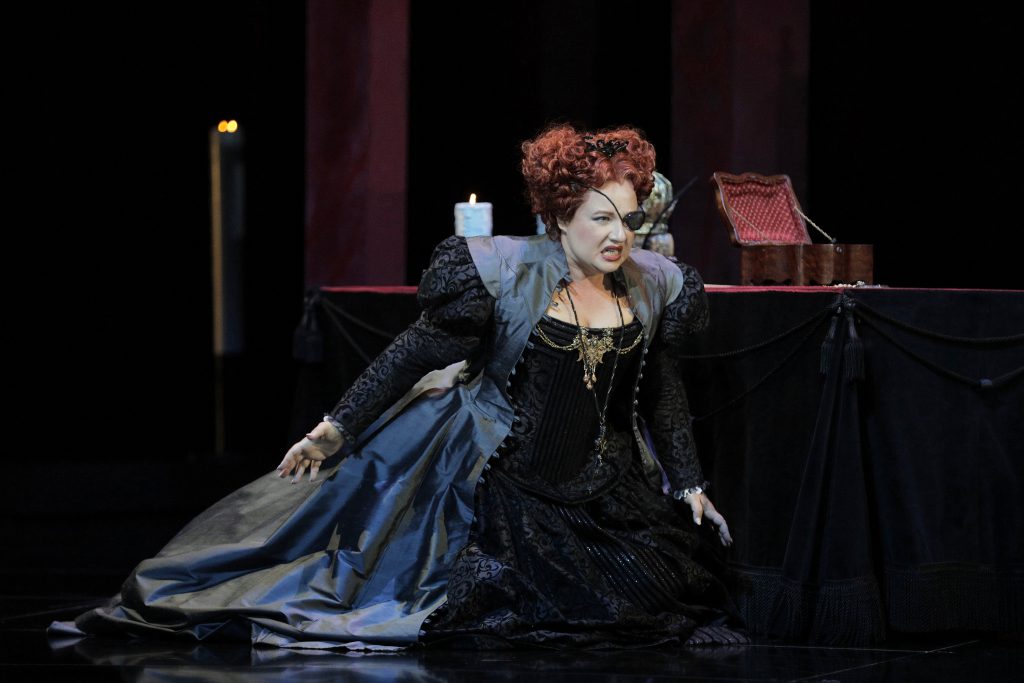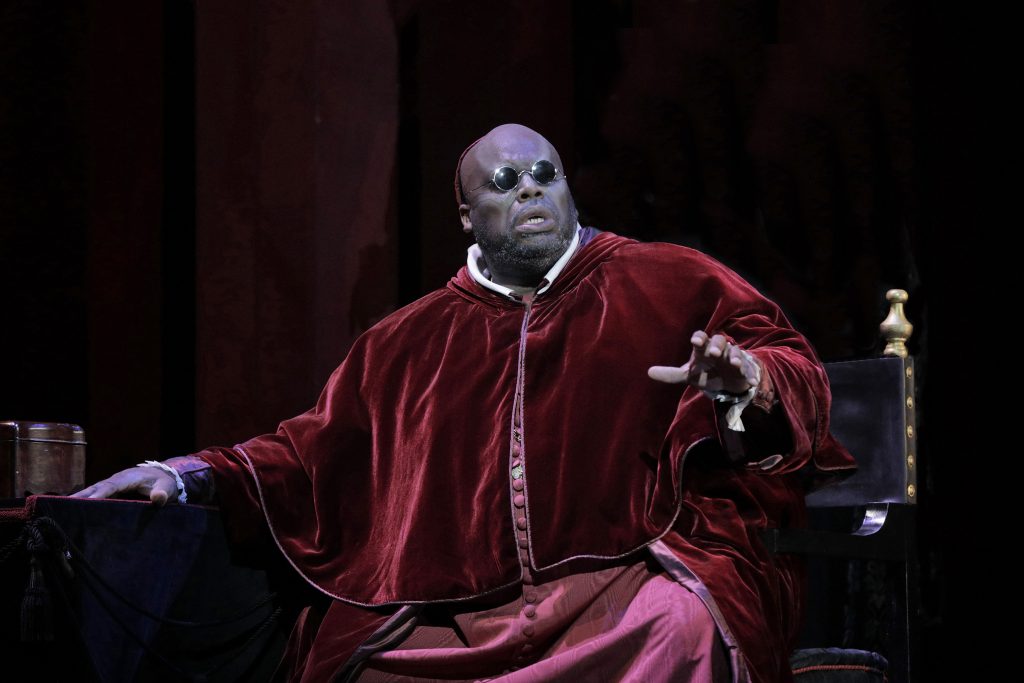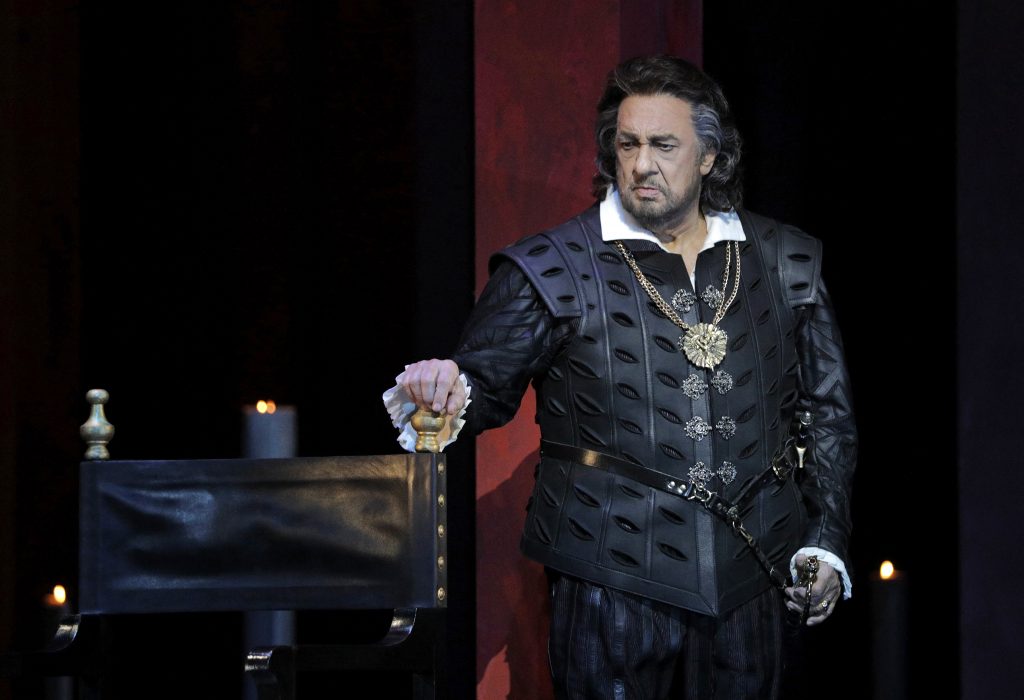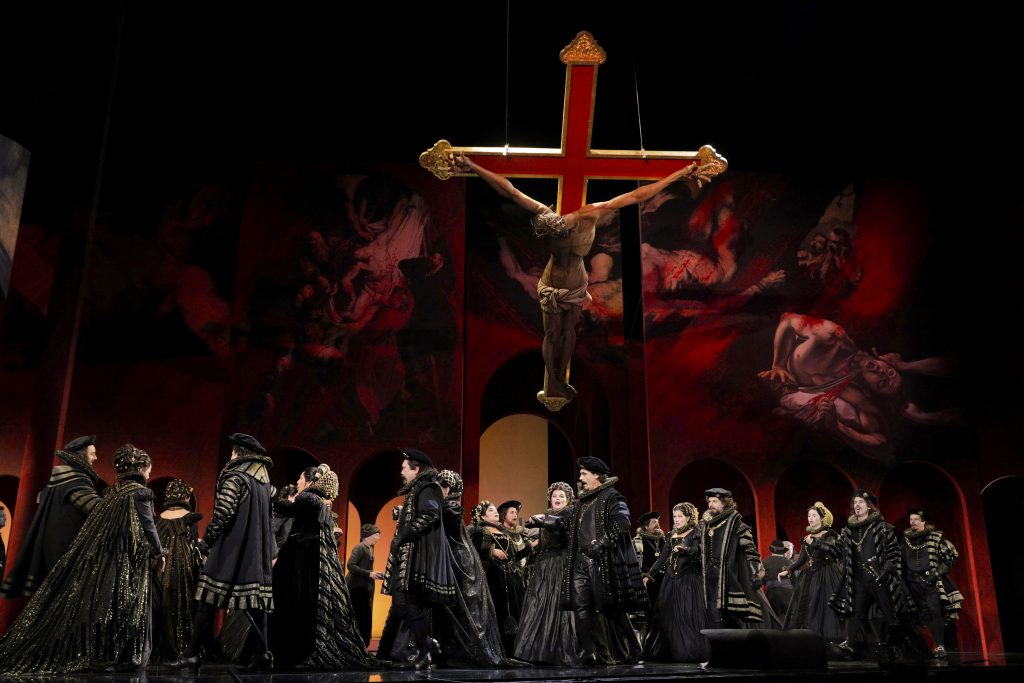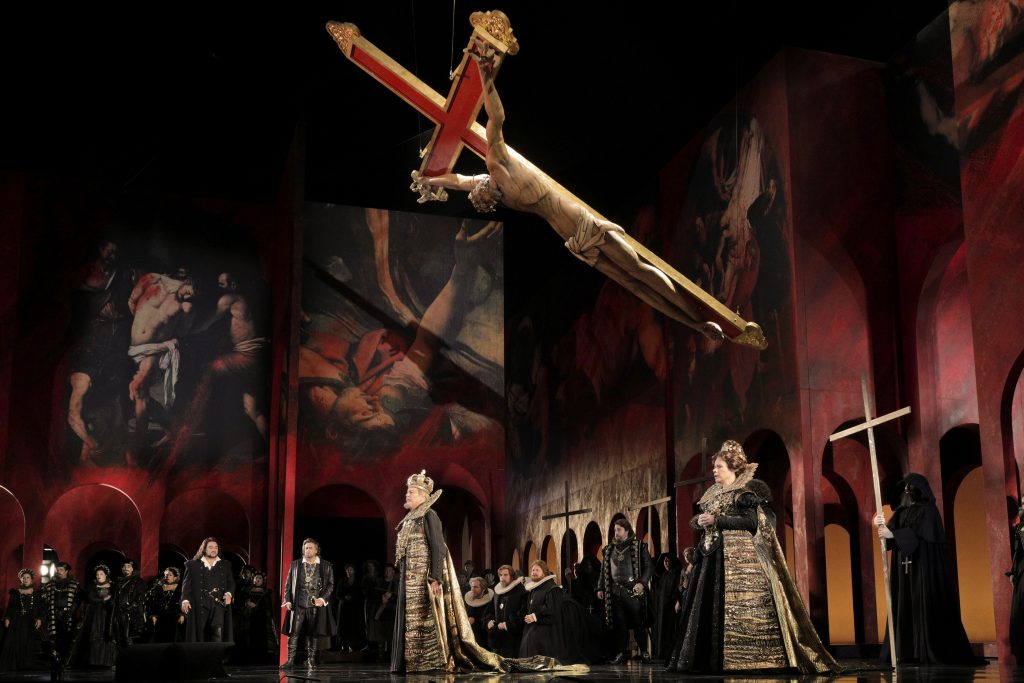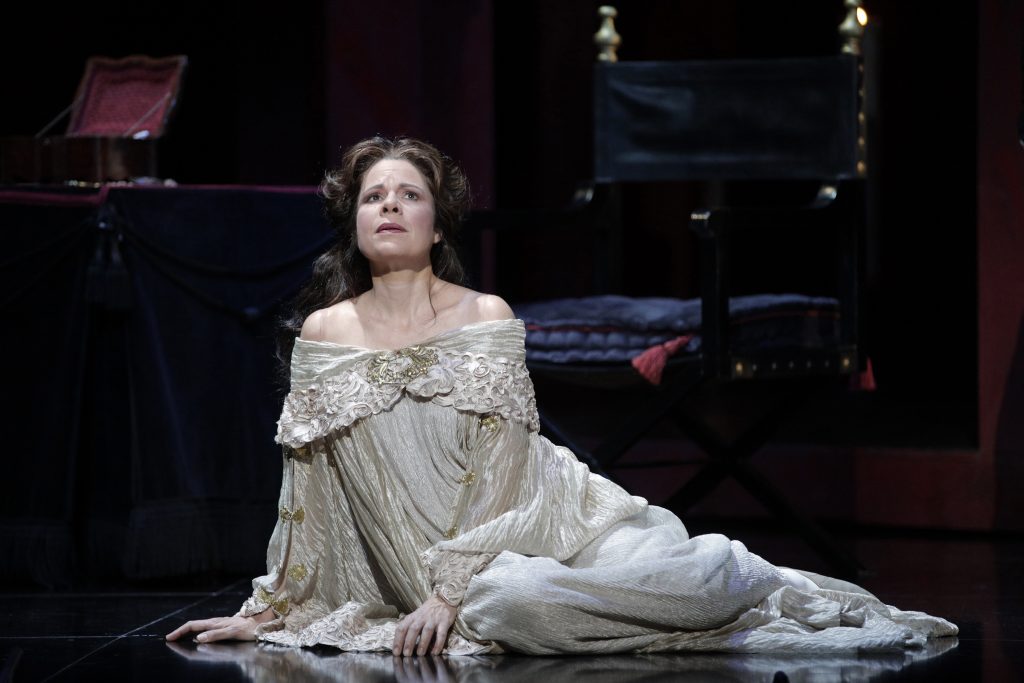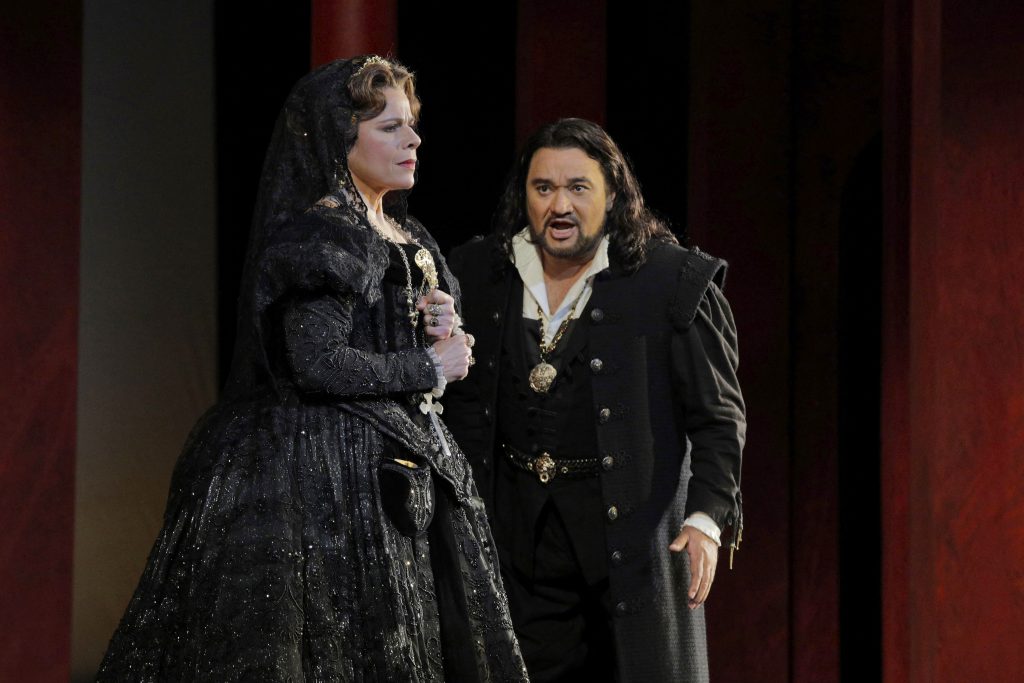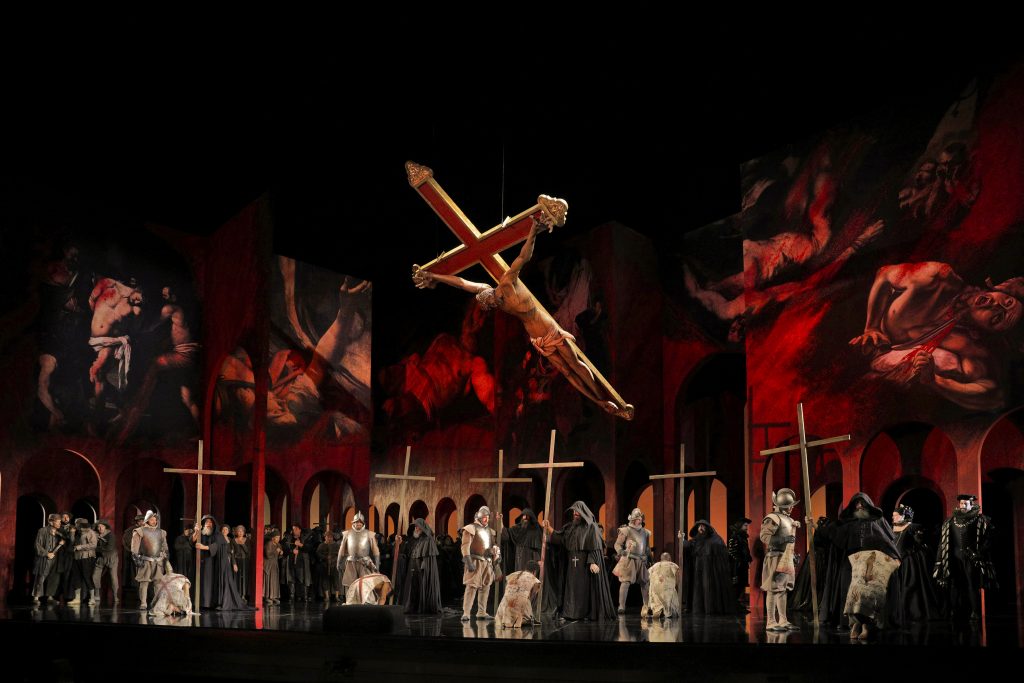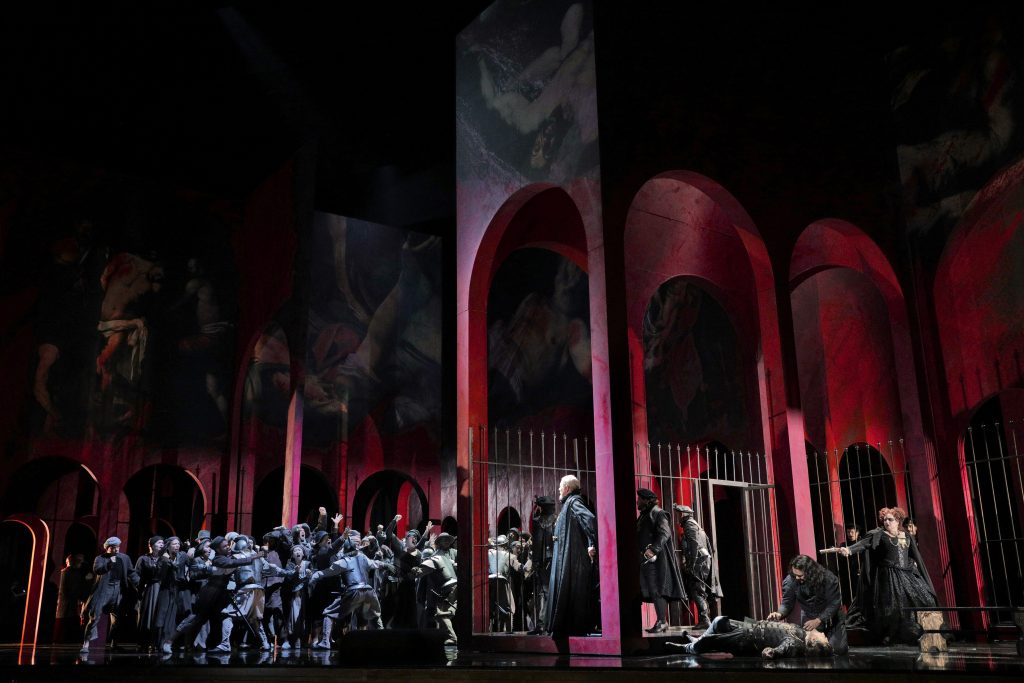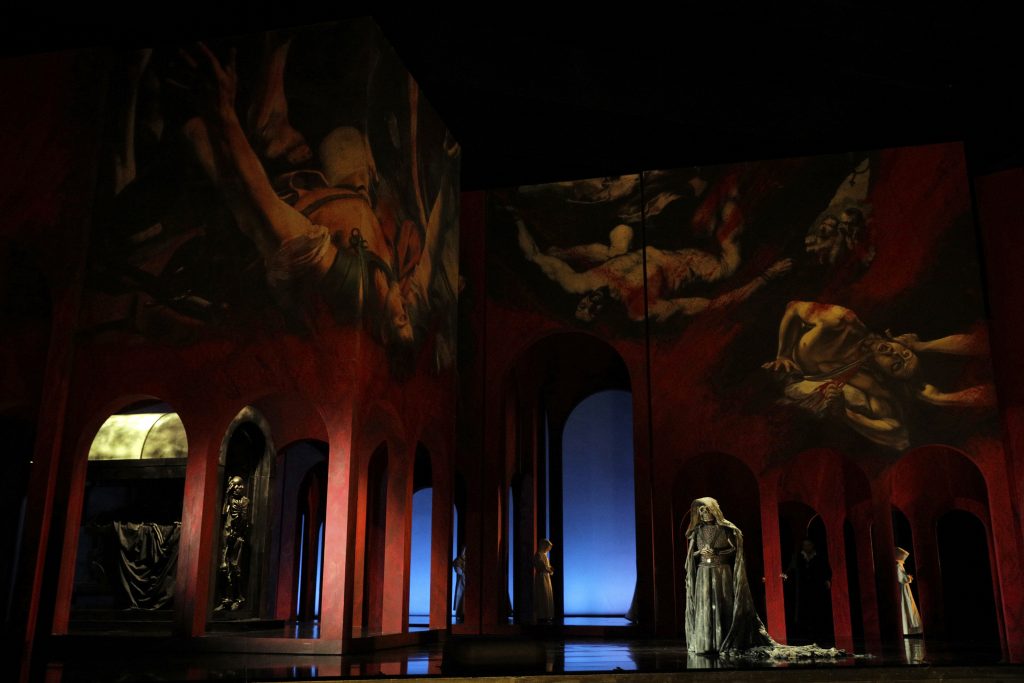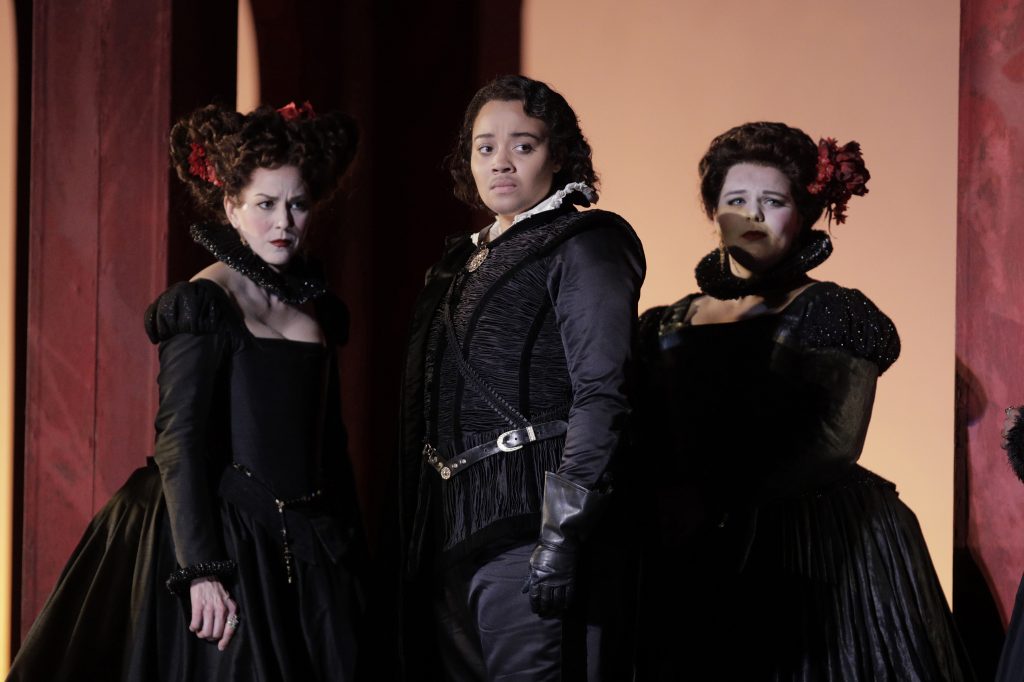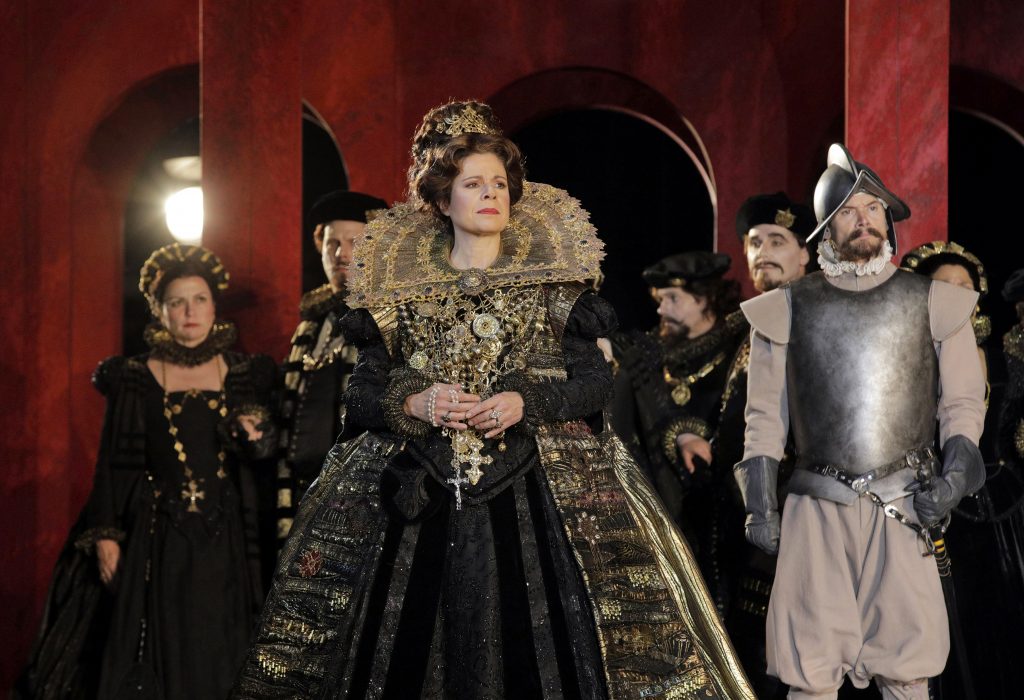DOMINGO A SHINING LIGHT
IN SOME DARK STAGING
In LA Opera’s production of Verdi’s Don Carlo, which has some cosmic casting but a stifling set and stingy staging, the titular character has had a rather rough time before a note is sung. He has sneaked away from his princely duties to meet his betrothed, Elisabeth de Valois (LA Opera regular, the luminous Puerto-Rican soprano Ana MarÃa MartÃnez). No sooner had they declared mutual adoration in the forest of Fontainebleau than news arrived: There was a change in treaty and Elisabeth — remembering her people and the desperate need for peace between the two kingdoms — instead decides to marry Carlo’s father, King Philip II of Spain (a sonorous Ferruccio Furlanetto).
Now, at curtain up, a despairing Carlo (Ramón Vargas, a very alluring tenor who nonetheless didn’t sound as dark, powerful and dramatic as his character) has returned to Spain to hide himself in the San Yuste monastery, where his deceased grandfather Carlo V devoted his life to prayer after abdicating the throne. Marquis of Posa and Carlo’s only friend, Rodrigo (an irreplaceable Plácido Domingo), is sympathetic about Carlo’s fiancée now being his stepmother, but he engages Carlos to help him free the people of Flanders from the aggressive Spanish occupation.
Wrapped up in the royal intrigue is Princess Eboli (a powerhouse Anna Smirnova, making her LA Opera debut), the court lady in love with Carlo, who also sleeps with his father, yet admires and wants to be the confidante of the Queen. She meets Carlo at night, hoping for a love assignation, only to rip into him when she realizes he loves the Queen. In her final aria, “Oh don fatale,” sung with amazing force by the Russian mezzo-soprano, she realizes the consequences of her mischief. (Although I must say that it’s tough to buy Smirnova as being “cursed by her beauty”; with her fiery-red witch hair and eye patch, I pictured the full-figured Smirnova as one of Cinderella’s stepsisters or a stowaway wench on a Disney pirate ship.)
The domineering antagonist is the blind Grand Inquisitor, who suggests the execution of Carlo — treasonous for attempting to murder his father — and demands the same of Rodrigo, arguing that the freedom fighter may be the king’s best companion, but he’s an even bigger traitor than Carlo deep down. When Phillip refuses to hand Rodrigo over, the Inquisitor warns that even a king can suffer at the hands of the Inquisition. Morris Robinson’s distinctive bass voice and giant stage presence as the Inquisitor made him a standout.
Indeed, LA Opera got all the big guns they needed vocally for this colossal, enigmatic, and profoundly beautiful opera — a remount of Ian Judge’s production, which premiered in 2006, also at the Dorothy Chandler Pavilion. But conductor James Conlon, who really knows how to bring out the beautiful orchestrations (you should hear him rehearse without the singers sometime!), began almost sluggishly, picking up the pace as the evening progressed. Grant Gershon, responsible for the amazing work of the LA Opera Chorus, had them as tight, rich and florid as his mighty LA Master Chorale.
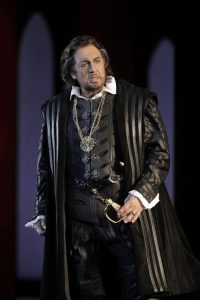 As for Plácido Domingo: On the strength of their name, many world-renowned singers who should have hung up their vocal chords long ago handle retirement by filling concert houses with nostalgia-filled patrons who seek a glimpse of their heroes live. Recent years have seen former opera stars prove to be mere wisps of their former glory. This is why I was a bit skeptical that the great opera tenor — who astounded as Carlo when he was 26 — was appearing as a baritone in the role of Rodrigo. But the indefatigable, fierce, thrilling, commanding, stirring, sparkling, and personality-drenched Domingo not only sounded sensational as a strong, mature baritone, but his emotional strength, passionate vitality, and terrific enunciation actually gave me chills, especially in the first act’s “Dio, che nell’alma infondere,” one of Verdi’s most radiant duets.
As for Plácido Domingo: On the strength of their name, many world-renowned singers who should have hung up their vocal chords long ago handle retirement by filling concert houses with nostalgia-filled patrons who seek a glimpse of their heroes live. Recent years have seen former opera stars prove to be mere wisps of their former glory. This is why I was a bit skeptical that the great opera tenor — who astounded as Carlo when he was 26 — was appearing as a baritone in the role of Rodrigo. But the indefatigable, fierce, thrilling, commanding, stirring, sparkling, and personality-drenched Domingo not only sounded sensational as a strong, mature baritone, but his emotional strength, passionate vitality, and terrific enunciation actually gave me chills, especially in the first act’s “Dio, che nell’alma infondere,” one of Verdi’s most radiant duets.
At almost 78, Domingo’s vigorous energy is baffling. He sings about 40 operatic performances a year, performs around 6 to 10 large-venue concerts, and retains conducting duties as well. He looks so great that I had to double-check my program to ensure that it was him playing Rodrigo. Is it genetic? Is it health food? Is he gargling with formaldehyde? Either way, we’re gloriously happy to have him. By expanding his repertoire, the general director of the Los Angeles Opera definitively proves that old tenors never die, they just find their inner baritone.
Librettists Joseph Méry and Camille Du Locle loosely based Don Carlo on Friedrich Schiller’s homonymous play, which itself is lightly based on the real life of King Philip II of Spain. Sung in French when it premiered in Paris in 1867, Verdi’s oft-revised opera (four versions exist; none are definitive) has two popular Italian-language revisions floating around the opera world: One is the 1886, five-act “Modena” version, with two intermissions, that runs nearly five hours.
LA Opera is doing the other: Verdi’s 1884 four-act version, translated into Italian by Achulle de Lauzières and Angeo Zanardini, which runs about 3 hours and 25 minutes with one interval. This revision slices off a lot of dramatic slag – including the entire first act and a ballet — thus giving the storyline more impetus. But with that opening act at Fontainebleu between Carlo and Elisabeth excised, we are only told about how they dreamed of ending up together, but we never experience it. Director Louisa Muller needed to take care of this somehow. All we get is Elisabeth lifting her hand towards Carlo as she walks offstage with her new husband, the King. We’re not drawn in to the romance or the hero’s plight.
There’s no elephant on stage as with Aida, but there is an elephant in the room. And that is the lack of vision when it comes to direction. It seems that opera fans are content to have great singing only. But for me opera is also theater, and that aspect of Don Carlo stretched my patience as if I was on the rack myself. Yes, I know that actors must concentrate on their voices, but opera’s not a museum.
For lo-o-o-ong periods of time, actors simply did not move — that ol’ “Park and Bark” element. At one point, Furlanetto sat in a chair singing into his hand as if it was an alien clutching his face; as if that wasn’t dramatically unsound enough, he finally removes his hand, but then remains sitting for the entire aria “Ella giammi m’amo.” (Alexander Vinogradov performs the role of King Philip II Oct. 4-14.) And when the female chorus is standing around wearing black dresses and holding veils, it looked like a minimalist production of The House of Bernarda Alba. And there were so many people in the auto-da-fé sequence, that we weren’t sure who to focus on underneath that giant slanted crucifix.
Speaking of which, when the cast came out for curtain call, I gasped at how gorgeous Tim Goodchild’s costumes were (albeit very inky), yet we could barely make them out with Rick Fisher’s low lighting (although that surely contributed to Domingo looking half his age). You would think the lights would offset set designer John Gunter’s sepulchral gloom, which has massive dark Carravagio knockoffs of violent scenes, all which hover over tall red arches. While the design amplified the voices quite well, the cheerless, dismal design felt somber, not terrifying or spooky.
And then, there’s the opera’s famous ’” and famously perplexing ’” conclusion. Some synopses say something like, “the gates of the cloister open and Don Carlo is drawn inside to safety.” In this production, an imposing skulled figure who looks like Dr. Doom dressed in a flowing ghostly monk’s robe appears, but if it is indeed the ghost of Carlo V saving his grandson from the inquisition by leading him to, I dunno, death, shouldn’t we be in on it? Why didn’t Muller have the ghost appear more in the opera? Truly bewildering.
In all fairness, the program’s synopsis mentions it’s the “spirit of the dead emperor,” yet that same summary says nothing about a page named Tebaldo, played here by a woman, Taylor Raven, or the celestial voice, sung beautifully by Liv Redpath, who soloed earlier in the day in LAMC’s Mozart’s Requiem at Disney Hall. And while I’m on the subject of making things clearer with or without the synopsis, rewriting the supertitles for a modern audience, instead of trying to be literal, would also help immensely. Boy, are they ever dull.
With voices and an orchestra as beautiful as this, it probably doesn’t matter to aficionados ultimately just what is going on. But I’m a little miffed that the director and designers left me in the dark.
 photos by Cory Weaver/LA Opera
photos by Cory Weaver/LA Opera
Don Carlo
LA Opera
Dorothy Chandler Pavilion, 135 North Grand Ave.
Saturday, September 29, 2018, at 7:30
Thursday, October 4, 2018, at 7:30
Sunday, October 7, 2018, at 2
Thursday, October 11, 2018, at 7:30
Sunday, October 14, 2018, at 2
for tickets, call 213.972.8001 or visit LA Opera
